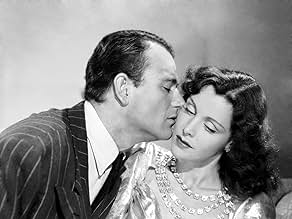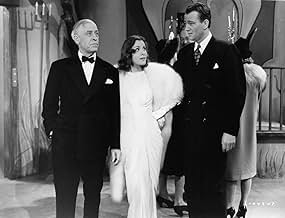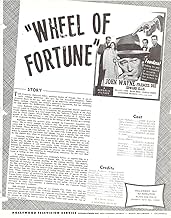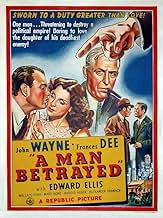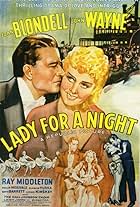A small-town attorney comes to the city to investigate the murder of a friend and falls in love with the daughter of the head of the crime ring he hopes to expose.A small-town attorney comes to the city to investigate the murder of a friend and falls in love with the daughter of the head of the crime ring he hopes to expose.A small-town attorney comes to the city to investigate the murder of a friend and falls in love with the daughter of the head of the crime ring he hopes to expose.
- Director
- Writers
- Stars
Edwin Stanley
- Prosecutor
- (as Ed Stanley)
Harry Allen
- Beggar Outside Club Inferno
- (uncredited)
Raymond Bailey
- Amato Henchman
- (uncredited)
Mary Bovard
- Brunette at Train Station
- (uncredited)
Buster Brodie
- Little Man at Soup Kitchen
- (uncredited)
- Director
- Writers
- All cast & crew
- Production, box office & more at IMDbPro
Featured reviews
One wonders how the script came to be written.
Wayne and the other performers do an OK job but as it is neither comedy, romantic thriller or anything else it is all rather disappointing.
One feels as if one of the threads had been pursued it could have been something worthwhile. It is nonetheless interesting to see a real turkey of a story made just before the USA became directly involved with the war. I wonder if the surrounding politics had something to do with trying to make a movie for all tastes but ending up with something that pleases no one.
Nonetheless it has historical value.
Wayne and the other performers do an OK job but as it is neither comedy, romantic thriller or anything else it is all rather disappointing.
One feels as if one of the threads had been pursued it could have been something worthwhile. It is nonetheless interesting to see a real turkey of a story made just before the USA became directly involved with the war. I wonder if the surrounding politics had something to do with trying to make a movie for all tastes but ending up with something that pleases no one.
Nonetheless it has historical value.
I enjoyed watching this movie, but there is no use pretending that it has any particular merit. It is interesting to watch early John Wayne movies where he is not playing a cowboy and not fiddling with his revolver. The female lead, Frances Dee, was very interesting to watch, lively and attractive. She reminds me of Geena Davis when young as in EARTH GIRLS ARE EASY (1988, see my review). She stopped acting in 1954, aged 55, and had made 56 films by then. The story of this film is so unconvincing and implausible that it is not even worthwhile attempting to describe it. It is nonsense from beginning to end. The Hungarian émigré director John H. Auer directed the film. It is both easy to watch and easy to forget.
Lynn Hollister, a small-town lawyer, travels to the nearby big city on business connected with the death of his friend Johnny. (Yes, Lynn is a man despite the feminine-sounding Christian name. Were the scriptwriters trying to make a snide reference to the fact that John Wayne's birth name was "Marion"?) Hollister at first believes Johnny's death to have been an accident, but soon realises that Johnny was murdered. Further investigations reveal a web of corruption, criminality and election rigging connected to Boss Cameron, the leading light in city 's political machine.
That sounds like the plot of a gritty crime thriller, possibly made in the film noir style which was starting to become popular in 1941. It isn't. "A Man Betrayed", despite its theme, is more like a light romantic comedy than a crime drama. Hollister falls in love with Cameron's attractive daughter Sabra, and the film then concentrates as much on their resulting romance as on the suspense elements.
This film might just have worked if it had been made as a straightforward serious drama. One reviewer states that John Wayne is not at all believable as a lawyer, but he couldn't play a cowboy in every movie, and a tough crusading lawyer taking on the forces of organised crime would probably have been well within his compass. Where I do agree with that reviewer is when he says that Wayne was no Cary Grant impersonator. Romantic comedy just wasn't up his street. One of the weaknesses of the studio system is that actors could be required to play any part their bosses demanded of them, regardless of whether it was up their street or not, and as Wayne was one of the few major stars working for Republic Pictures they doubtless wanted to get as much mileage out of him as they could.
That said, not even Cary Grant himself could have made "A Man Betrayed" work as a comedy. That's not a reflection on his comic talents; it's a reflection on the total lack of amusing material in this film. I doubt if anyone, no matter how well developed their sense of humour might be, could find anything to laugh at in it. The film's light-hearted tone doesn't make it a successful comedy; it just prevents it from being taken seriously as anything else. This is one of those films that are neither fish nor flesh nor fowl nor good red herring. 3/10
That sounds like the plot of a gritty crime thriller, possibly made in the film noir style which was starting to become popular in 1941. It isn't. "A Man Betrayed", despite its theme, is more like a light romantic comedy than a crime drama. Hollister falls in love with Cameron's attractive daughter Sabra, and the film then concentrates as much on their resulting romance as on the suspense elements.
This film might just have worked if it had been made as a straightforward serious drama. One reviewer states that John Wayne is not at all believable as a lawyer, but he couldn't play a cowboy in every movie, and a tough crusading lawyer taking on the forces of organised crime would probably have been well within his compass. Where I do agree with that reviewer is when he says that Wayne was no Cary Grant impersonator. Romantic comedy just wasn't up his street. One of the weaknesses of the studio system is that actors could be required to play any part their bosses demanded of them, regardless of whether it was up their street or not, and as Wayne was one of the few major stars working for Republic Pictures they doubtless wanted to get as much mileage out of him as they could.
That said, not even Cary Grant himself could have made "A Man Betrayed" work as a comedy. That's not a reflection on his comic talents; it's a reflection on the total lack of amusing material in this film. I doubt if anyone, no matter how well developed their sense of humour might be, could find anything to laugh at in it. The film's light-hearted tone doesn't make it a successful comedy; it just prevents it from being taken seriously as anything else. This is one of those films that are neither fish nor flesh nor fowl nor good red herring. 3/10
In New York, a small-town basketball player stumbles out of kingpin Cameron's club, Inferno, gets struck by lightening and dies. Investigation reveals he was shot but the papers are put under pressure to report it as a suicide. Lawyer Lynn Hollister arrives the next day from Spring Valley to investigate the death, firm in his belief that his friend would not have taken his own life.
From the plot summary, this film sounded like Wayne would be in a tough-talking crime thriller where he uncovers a political web of corruption. However, despite the dramatic (rather supernatural) opening, for over an hour it simply isn't that at all. It actually seems to aim for some sort of light comedy where Lynn is very much the small-town hick who greets everything with a smile and an `ahh-schucks'. This is not a bad thing but it doesn't really sit with the dramatic intensions.
After an hour, Lynn turns on those he has been feeling out for a while, but even then it keeps the gently comic tone in spits and spats. However the arrival of tough talking (even with comic interludes) is welcome and it helps the film a great deal in the final 30 minutes. The lack of tension and excitement is not so much due to the comic stuff as it is to the lack of a really tight, coherent script. The film is about the powerful Cameron who has his hands everywhere - controlling the media and the politicians just enough to put the squeeze on them. However the film doesn't deliver this well enough and I was left unconvinced by the size of the web - and therefore rather uninvolved in the whole film.
Wayne is OK at the comic stuff and the tough talking stuff but it's like he's flicking a switch in this film - tough one minute, completely different the next; it spoils his character a bit. Why his character is called Lynn is beyond me as I've never heard it for a boy before - although Wayne's no stranger to unusual names. Dee is dark and sexy in a good role, but she isn't given enough time. Ellis is OK but fails to come across as the master that the plot requires him to be. A small role for noir favourite Ward Bond adds to the interest.
Overall this is an OK film but it's mix of comedy and drama just doesn't work and it gives the film an uneven feel. It turns it around a bit in the final 25 minutes but by then it is too late to build tension. The power of Cameron never really comes through and, for the majority of the film, you could be forgiven for thinking it was a whimsical romantic comedy rather than a murder mystery film.
From the plot summary, this film sounded like Wayne would be in a tough-talking crime thriller where he uncovers a political web of corruption. However, despite the dramatic (rather supernatural) opening, for over an hour it simply isn't that at all. It actually seems to aim for some sort of light comedy where Lynn is very much the small-town hick who greets everything with a smile and an `ahh-schucks'. This is not a bad thing but it doesn't really sit with the dramatic intensions.
After an hour, Lynn turns on those he has been feeling out for a while, but even then it keeps the gently comic tone in spits and spats. However the arrival of tough talking (even with comic interludes) is welcome and it helps the film a great deal in the final 30 minutes. The lack of tension and excitement is not so much due to the comic stuff as it is to the lack of a really tight, coherent script. The film is about the powerful Cameron who has his hands everywhere - controlling the media and the politicians just enough to put the squeeze on them. However the film doesn't deliver this well enough and I was left unconvinced by the size of the web - and therefore rather uninvolved in the whole film.
Wayne is OK at the comic stuff and the tough talking stuff but it's like he's flicking a switch in this film - tough one minute, completely different the next; it spoils his character a bit. Why his character is called Lynn is beyond me as I've never heard it for a boy before - although Wayne's no stranger to unusual names. Dee is dark and sexy in a good role, but she isn't given enough time. Ellis is OK but fails to come across as the master that the plot requires him to be. A small role for noir favourite Ward Bond adds to the interest.
Overall this is an OK film but it's mix of comedy and drama just doesn't work and it gives the film an uneven feel. It turns it around a bit in the final 25 minutes but by then it is too late to build tension. The power of Cameron never really comes through and, for the majority of the film, you could be forgiven for thinking it was a whimsical romantic comedy rather than a murder mystery film.
Lawyer John Wayne's friend, a high school basketball star from his town, is shot down and then run over by a car. The death is declared a suicide by the local coroner. Wayne goes to the big city to investigate.
Wayne's directed to see Edward Ellis who is the local political boss and of course the Duke falls big time for Ellis's daughter Frances Dee. Never mind he's got a job to do, even if it costs him Dee.
This was John Wayne's one and only attempt at playing a crusader type, a scaled down version of Jefferson Smith. Ellis is a combination of the characters played by Edward Arnold and Claude Rains in Mr. Smith Goes to Washington and Dee combines both Jean Arthur and Astrid Allwyn. I'd say the results were mixed. Perhaps with a better script at a larger studio with more production values, Wayne might have done more with the part.
As it is there are some nice John Wayne style fight scenes in A Man Betrayed, a couple with Ward Bond, and a king sized brawl outside a polling place where Ellis is bringing in repeaters from his sponsored soup kitchens. Machine politics, American style. Hopefully none of those countries where we're crusading for democracy ever sees this film.
Ward Bond plays the moronic brother of Alexander Granach, owner of the red light district club where Wayne's friend was killed in. His performance while good, was a carbon copy of Lon Chaney, Jr.'s from Of Mice and Men. I expected him to ask Granach about the bunny rabbits any minute.
At this phase of Wayne's career, Republic was casting him in a variety of parts to broaden his casting potential in the wake of his success with Stagecoach. Herbert J. Yates of Republic films was making almost as much money loaning Wayne out as in his own films and he was trying to make him more marketable. He didn't succeed with A Man Betrayed, but it wasn't the Duke's fault by any means.
Wayne's directed to see Edward Ellis who is the local political boss and of course the Duke falls big time for Ellis's daughter Frances Dee. Never mind he's got a job to do, even if it costs him Dee.
This was John Wayne's one and only attempt at playing a crusader type, a scaled down version of Jefferson Smith. Ellis is a combination of the characters played by Edward Arnold and Claude Rains in Mr. Smith Goes to Washington and Dee combines both Jean Arthur and Astrid Allwyn. I'd say the results were mixed. Perhaps with a better script at a larger studio with more production values, Wayne might have done more with the part.
As it is there are some nice John Wayne style fight scenes in A Man Betrayed, a couple with Ward Bond, and a king sized brawl outside a polling place where Ellis is bringing in repeaters from his sponsored soup kitchens. Machine politics, American style. Hopefully none of those countries where we're crusading for democracy ever sees this film.
Ward Bond plays the moronic brother of Alexander Granach, owner of the red light district club where Wayne's friend was killed in. His performance while good, was a carbon copy of Lon Chaney, Jr.'s from Of Mice and Men. I expected him to ask Granach about the bunny rabbits any minute.
At this phase of Wayne's career, Republic was casting him in a variety of parts to broaden his casting potential in the wake of his success with Stagecoach. Herbert J. Yates of Republic films was making almost as much money loaning Wayne out as in his own films and he was trying to make him more marketable. He didn't succeed with A Man Betrayed, but it wasn't the Duke's fault by any means.
Did you know
- TriviaAccording to a member of Frances Dee's family, the scene in which John Wayne wraps her up in a tablecloth and carries her out to the car was scripted to use a double for Dee. Wayne spontaneously carried off Dee instead, shocking her. The director left it in.
- GoofsA wire can be seen attached to the speech papers. The papers are supposed to be blown away by an electric fan.
- Quotes
Lynn Hollister: You know, you'd be lovely if you had brown hair.
Sabra Cameron: I have brown hair.
Lynn Hollister: [Fixing his eyes on her] Yeah... !
- Crazy creditsVery near the end of the film where it shows all the luggage is marked "Spring Valley" even on the motorcycle policemen's motorcycle, then on the last policeman's back is a package marked "The End".
- ConnectionsReferences I Am a Fugitive from a Chain Gang (1932)
- SoundtracksAuld Lang Syne
(uncredited)
Traditional
Played as part of the score twice
Details
Box office
- Budget
- $250,000 (estimated)
- Runtime1 hour 22 minutes
- Color
- Aspect ratio
- 1.37 : 1
Contribute to this page
Suggest an edit or add missing content


